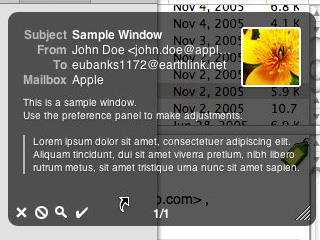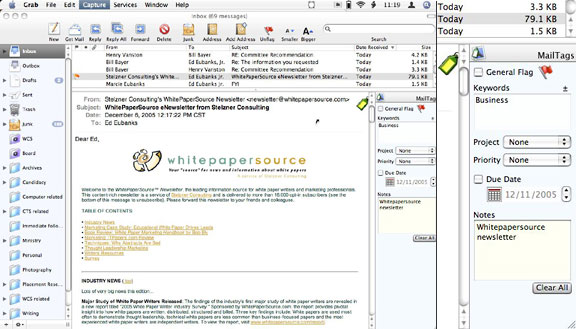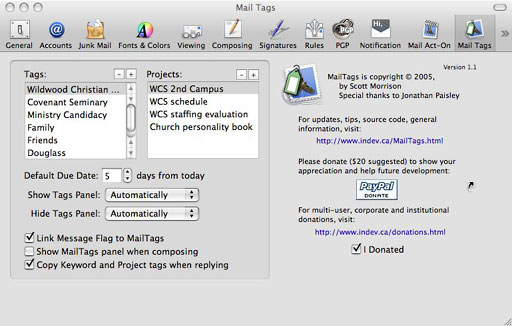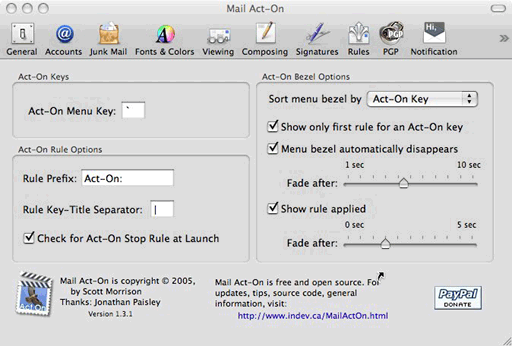Two months ago I decided to move away from Microsoft's Entourage
as my calendar, address book, and mail client and move to Apple's
equivalent applications. I've been pleased with the move, and this
will be the first of several articles for the Efficient Mac User
that will look at the power and substance of Apple's offerings.
I know that Entourage is very popular - some will even argue
that it is the best thing going for the Mac - and I'm not trying to
dispute its merits or its power. My goal is to show how a Mac user
can get as much out of the included applications as they can from
the likes of Entourage - and maybe more.
In other words, Mac users don't have to pay for a mail client to
get a good one.
Entourage Disclaimer
Let me make this disclaimer, lest my Efficient Mac User mailbag
(and my Mail inbox) overflow with complaints and opposition: I
don't think I have a clear picture of the power of Entourage. In
fact, I'm quite certain there is more to it than I realize - and
that I might not have switched if I knew all that it could do.
I do know this: Whatever power is there is buried too deeply in
the "Microsoftism" of the application for me to discover it. Like
so many Microsoft applications, there is such a steep learning
curve to the program that I was simply daunted by it. (I read that
a recent survey showed that something like 90% of the features that
Microsoft Word for Windows users requested to be added were already
there - they were just too hard to find. I suspect Entourage is
like that, too.)
So I'm using Apple's Mail, and I love it. It has a clean,
straightforward interface and an elegant design. Aesthetically, it
doesn't stand out as eye-candy, but it certainly doesn't get in my
way with ugliness either. It opens quickly, behaves well, and plays
nicely with other applications.
Here are some aspects of Mail that make it work for me - and can
work for you, too.
Essential Features in Mail 2.x
There are definitely some features that I consider essentials.
They make my life easier and I wouldn't want to do without them. By
the way, it so happens that two of these are unique to Mail (at
least when compared to Entourage).
.mac integration
I like .mac. It works for me, because I don't like to bother
with backing up as much as I should. .mac offers me a solution to
this that is completely integrated into the system.
When it comes to Mail, I use .mac to sync everything that it
can. This means that my account settings, rules, signatures, and
smart mailboxes are all synchronized with my .mac account. If
everything should crash today or if my iBook should be stolen, I
could access all of my settings for Mail from any computer - all I
would have to do is log into .mac and ask it to sync with Mail. (By
the way, since I switched to Address Book, all of my contacts are
also backed up to .mac.)
This is great, because I've lost my contacts before, so I know
the dread that comes with restoring these manually. I've also spent
the time that it takes restoring the settings for mail clients, and
knowing I won't have to do it again is a comfort. I can't get that
very easily with Entourage.
Spotlight
The reception for Spotlight has been (pardon me) spotty, but I
find that it works pretty well for me. In fact, I use it often, and
Entourage's lack of compatibility with Spotlight, though
understandable, was one of the big reasons why I switched away from
it.
Spotlight is fully functional with Mail, naturally. Spotlight in
Mail was one of Steve Job's demonstrations of the benefits of
Tiger. Smart Mailboxes, Smart Folders, desktop searches, and better
searching within Mail are all benefits of Spotlight's deep
integration with the Apple applications.
I haven't put Smart Mailboxes or Folders to use very much, but I
do desktop searches and searches within Mail all the time.
Spotlight is a great reason to give Mail a try.
Per-account Signatures
I manage multiple email accounts with Mail, which it handles
flawlessly (so did Entourage). I've begun to use signatures more
and more. Mail allows me to set up signatures specific to each
account so that they are automatically there depending on the email
account I've selected. (Entourage does this, too, and for me this
has become an essential feature, so I was pleased I didn't have to
sacrifice it in the switch.)
Tools I Couldn't (or Wouldn't Want to) Live Without
To get the most out of Mail, I've taken advantage of a few of
the many plug-ins and integrated applications available for Mail.
Here are some that I find really boost my Mail productivity - these
are the true Efficient Mac User picks.
SpamSieve
Anyone out there like spam? With ten different email accounts, I
certainly get my share. Mail's "Rules" settings are a good start,
and Mail works well with mail servers to intercept spam (see
below), but I found that I needed a little more protection.
Enter SpamSieve by
C-Command. This gem of an application has gotten a lot of positive
mention, even several times here on Low End Mac. Let me give it
another plug: If you use email, you will want SpamSieve. It's
simple to set up, it works very well with Mail (and Entourage, and
just about every mail client I've heard of), and it's pretty close
to foolproof.
SpamSieve uses Bayesian filtering, which means it determines the
probability that an email is spam based on the content of the
message itself. In essence it reads the mail for you, then
determines if you will want to read it. To do this, it doesn't
simply look at the content of that one message, it also compares
that content to other messages, both good and bad (spam), to learn
with a sort of artificial intelligence what kinds of messages are
probably spam.
SpamSieve learns from your email with your input, so it
customizes its filtering according to your mailbox contents. As a
result, it's robust and very accurate. Since I installed it (over a
month ago), I have had to deal with only one or two spam messages
in my inbox. I also have only found three messages marked as spam
that I wanted to keep, and SpamSieve lets me train it when it makes
a mistake.
SpamSieve is shareware, and for only $25 you can have the same
kind of freedom from spam that I now enjoy.
Mail.appetizer
 One of the things that I liked about Entourage
was the notification of new messages, even when Entourage was
minimized or behind other windows. I found the free plug-in
Mail.appetizer
to offer the same benefits in Mail.
One of the things that I liked about Entourage
was the notification of new messages, even when Entourage was
minimized or behind other windows. I found the free plug-in
Mail.appetizer
to offer the same benefits in Mail.
In fact, Mail.appetizer gives me even better notification,
because it's customizable (I can select how little or how much
notification I have) and it allows me to exercise some control over
the received messages without switching applications. For example,
I can choose to delete the message, mark it as read, or open it in
Mail from the notification box. Also, the box is "sticky" when my
computer is inactive, so if I've stepped away from the computer,
the notification lingers until I get back.
I used to use another free application, Growl, for Mail notification. Growl does a
good job, and has a nice, basic notification box. I just like
Mail.appetizer's rich features more.
MailTags
Spotlight is really good as is; when you combine it with some
useful metadata, however, it really begins to shine. For example,
if you invoke the "Information" window for any file in Finder,
you'll see that there is a field for Spotlight comments. These
improve Spotlight's accuracy drastically.

MailTags offers
the same function within Mail. You can insert preset or customized
Keyword tags and Project tags, as well as notes, prioritization,
and due dates, into metadata that is Spotlight-searchable. MailTags
sets up easily in the Mail preferences window and utilizes a
sidebar interface that is straightforward, doesn't obscure your
regular mail usage, and hides easily. MailTags is donationware with
a $20 recommended donation.

Mail Act-On
I use a bunch of folders to sort and organize my mail. I've
always done this, and it has typically meant the occasional hour or
two of sorting a few hundred emails every month or so. Select,
drag, drop. Over and over.
Mail Act-On
offers a neat alternative, using a few keystrokes to take any
selected messages and complete any set of predetermined rules
and/or actions on them. You can sort them into a particular folder,
mark them with a flag, and mark them as unread. You can specify
that a particular rule will work only if the message was from a
certain email address. You can use it to engage systems of
organization, such as David Allen's popular "Getting Things Done"
method. Use it to archive your messages to a back-up location,
engage decision-based actions, or activate an AppleScript.

An added bonus: Mail Act-On works nicely with MailTags. For
example, I have a Mail Act-On keystroke set up to mark a selected
message with a flag, move it to my "Writing: Current Projects"
folder, and mark its MailTags as keyword: Writing; project: Low End
Mac column. With a mouse-click to select and two keystrokes, all of
those actions are handled for me.
Mail Act-On is a great productivity-booster and
efficiency-helper. And since it's open-source, it won't cost you
anything to add it your system.
Mail Stamps & Uno

Interface matters. I like a clean, basic interface for all of my
applications.
I admit it: I liked the old Mail 1.x buttons better than those
that Tiger brought with it. This is fixed easily enough: Mail Stamps is a
simple utility that changes the buttons to the old ones found in
Mail 1.x. A couple of clicks, and you're done.

You may have noticed that the Aqua interface design that graces
Mail is absent in my screen shots. That's because I used Interacto's Uno GUI unifier to
achieve a uniform interface in every application and window. Aqua,
brushed metal, "burnt" brushed metal, and everything else - all
have given way to a clean, straightforward interface design.
Features and Tools I Use Just a Little Bit (but I'm Glad
They're There)
There is a lot of power in Mail that I don't use very often.
Nevertheless, having it at my disposal when and if I should need it
is a great comfort.
Parental Controls
Our three-year-old son is getting more interested in the
computer every day. I love the fact that Mail has very good
parental controls built-in. Our kids won't use my iBook very much,
but they'll use Marcie's Mac
mini a lot, and we'll take full advantage of Apple's thorough
attention to parental controls, including good work with Mail's
capabilities.
Spam-analysis Tool Leverage
Some of the mail servers that I access utilize server-based
spam-analysis tools, like SpamAssassin and Brightmail. Mail
leverages these for better spam reduction and filtering. Even
though I use additional spam tools (see above), I'm glad that Mail
has the strong spam-analysis features that it does.
iCal Invitations
Like Entourage, iCal can invite others to events through an
email invitation. Mail is the conduit for iCal invitations, and
they are usable by anyone else who runs iCal.
Fax Management
OS X allows any application to send a fax. What's more, the
built-in modem can also receive faxes just like a standard fax
machine, and here's a nice touch: Mail manages and organizes those
faxes.
iPhoto Integration
Marcie handles most of the photo organization for our family
using iPhoto, so I end up using iPhoto only occasionally. When I
have used it, however, I've found Mail's easy integration with
iPhoto to be a great feature - one-click adds any attached photo
into your iPhoto library.
AppleScripts
AppleScript is a robust technology that not many of us utilize
to anything close to its potential. While I don't use it very much
myself, I have found that occasionally an AppleScript can
accomplish something for me that would be a hassle otherwise. I've
found Mail Scripts
2.7.8 to be a nice collection of scripts; you may also want to
check out Mail2iCal and
Mail2iCalToDo, which, as their names imply, allow you to easily
transfer an email into iCal as an event or to-do item.
RuleBox
As your Mail Rules get more sophisticated for filtering emails,
you may encounter the frustration of "broken rules" when a friend
changes to a new email address. RuleBox offers a
good solution: It will clean up the relationships between Mail
Rules and Address Book entries.
GPGMail
I don't find it necessary to encrypt emails - or any other files
- very often. (I think I can remember doing it about five times in
as many years.) It would be a true waste of money, therefore, to
pay for an encryption program. On the other hand, it's easy to keep
GPGMail,
an open-source encryption plug-in based on Mac GNU Privacy Guard,
on hand for those few times when I will send or receive an
encrypted email.
Features I Don't Use but Find Appealing
Mail has a few remaining features that appeal to me, not because
I'll use them anytime soon but because I'm concerned about
efficiency and functionality on the Mac.
Microsoft Exchange Compatibility
One of the big complaints I used to hear about Mail was that it
wasn't compatible with Microsoft Exchange servers. Mail 2.x is
compatible.
Integration with DayLite
I haven't used DayLite, but it gets
great reviews, and many people use it to manage contacts and
business networks. I understand that the Mail integration for
DayLite is every bit as powerful as DayLite itself, which is to say
that it's highly commendable.
MailPriority
This neat plug-in made functions like message priorities,
message coloring, and return receipts easy to handle for pre-Tiger
Mail users. Hopefully a Tiger-compatible version of MailPriority
is on the way.
Features I Would Like to See in Mail
There are a few things that Mail doesn't offer (and neither do
any third-party developers that I've found). Three features I would
love to see in Mail:
Bulleted and Numbered Lists
I like to use bullets in my emails; they make things easier to
read quickly, and that's good for efficiency. Numbered lists also
help, but these are easy to do without a formatting option. Until
Mail offers true bullets, I'll get by using a tab-indent and the
tilde (that's the ~ symbol).
MailPriority for Tiger
Mail already has message priorities, so I'd settle for just
return receipts, another feature that I use infrequently - but
often enough to value it. Entourage had it, but you had to turn it
on or off with a hard-to-reach dialog. Mail could offer this easily
in a future update.
Address Book-specified Email Accounts
I may be the only one in the world who wants this feature, but
here we go: What if I could specify in my Address Book what my
default email account would be for a given contact? Since I manage
ten different accounts, this would save me tons of time over the
course of a week, a month, or a year. Just a few less clicks would
boost my morale as well. (Any developers who want to take me up on
this are welcome to use the idea.)
Mail is a powerful, elegant program, and a few third-party
plug-ins and integrated applications gives it more power still. As
I consider how much Mail has to offer, it seems clear that it
offers features rich enough to accommodate my needs for some time
to come.
Mail works for me, and it can work for you. 

 One of the things that I liked about Entourage
was the notification of new messages, even when Entourage was
minimized or behind other windows. I found the free plug-in
One of the things that I liked about Entourage
was the notification of new messages, even when Entourage was
minimized or behind other windows. I found the free plug-in




